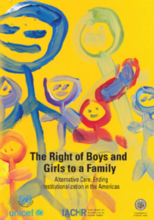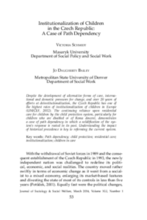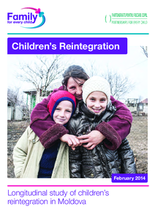Displaying 541 - 550 of 771
Infant Mental Health Journal has published an important Special Issue on Global Research, Practice, and Policy Issues in the Care of Infants and Young Children at Risk. This article describes the adverse mental health effects of violence and abuse in an institution in Tanzania.
Infant Mental Health Journal has published an important Special Issue on Global Research, Practice, and Policy Issues in the Care of Infants and Young Children at Risk. This article reports on a quasi-experimental study commissioned by the Chilean government that had two general aims: (a) to assess infants’ psychoaffective developmental levels and (b) to evaluate whether an intervention based on the promotion of socioemotional development modifies the infant's psychoaffective development.
Infant Mental Health Journal has published an important Special Issue on Global Research, Practice, and Policy Issues in the Care of Infants and Young Children at Risk. In this article, behavior problems were studied in fifty 5- to 8-year-old children transferred from a socioemotionally depriving Russian institution to domestic families.
This introductory article of a Special Issue of Infant Mental Health Journal on Global Research, Practice, and Policy Issues in the Care of Infants and Young Children at Risk provides a useful overview, placing the articles in the broader contexts of research on institutionalized children and different initiatives to prevent inappropriate care, either through addressing the quality of the care provided or ensuring the appropriateness of the type of care environment provided.
Infant Mental Health Journal has published an important Special Issue on Global Research, Practice, and Policy Issues in the Care of Infants and Young Children at Risk. This article provides a case study of a project to improve the health, safety, and development of children birth to 6 years old in a large orphanage in Nepal.
This report by the Inter-American Commission on Human Rights (IACHR) analyzes children’s right to live and be raised by their families, and establishes the resulting obligations for States when it comes to supporting and strengthening families’ ability to raise and care for their children.
Despite the development of alternative forms of care, international and domestic pressures for change, and over 20 years of efforts at deinstitutionalization, the Czech Republic has one of the highest rates of institutionalization of children in E
This important report documents a 22-month longitudinal study of the reintegration of children in residential care in Moldova.
A presentation on the "Orphan Industrial Complex" at the Young Lives and Globalization in Africa workshop at the University of Liège, Belgium on 21st February 2014.
The Infant Mental Health Journal has published an important Special Issue on Global Research, Practice, and Policy Issues in the Care of Infants and Young Children at Risk. This article documents how between 2005 and 2013, the Government in the Republic of Georgia closed 32 large, state-run institutions housing children without adequate family care.



